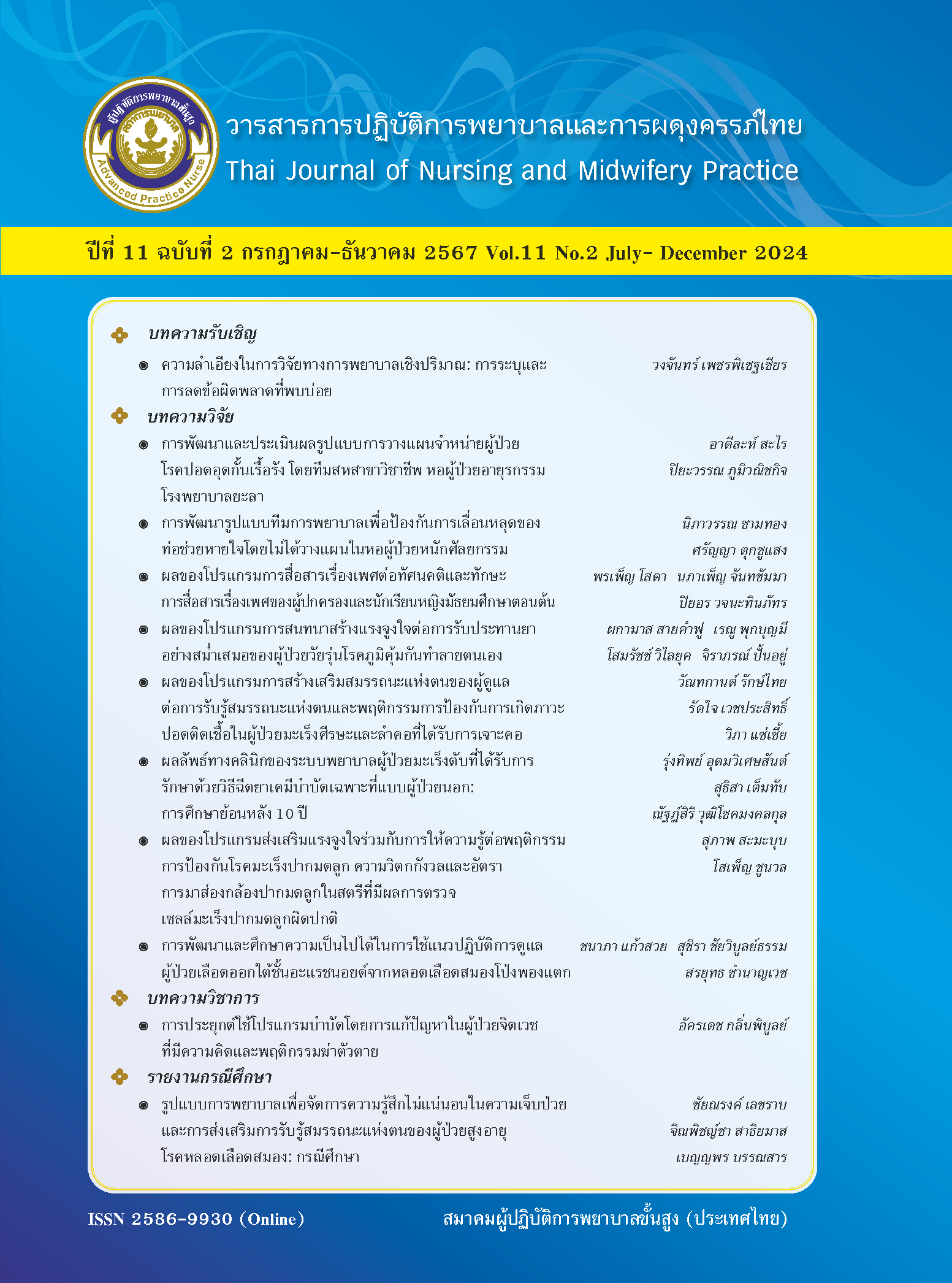Development of a Team Nursing Model for Prevention of Unplanned Extubation in Surgical Intensive Care Unit
Main Article Content
Abstract
Abstract: This participatory action research aimed to develop and evaluate a team nursing model to prevent unplanned extubation. The sample comprised 56 nursing practitioners working in the surgical intensive care unit and 200 patients with oral intubation admitted in the surgical intensive care unit between February and September 2023. Data were collected by focus group discussion and survey report of the incidence of unplanned extubation. Data were analyzed by frequency, percentage and content analysis. The research revealed that the team nursing model for prevention of unplanned extubation involved 1) role and responsibility of team nursing, 2) training for promoting team learning and skills development, 3) implementing leadership in nursing teams, 4) double checking, 5) bedside shift rounds, 6) rapid rounds, 7) regular feedback and assessment, and 8) compliments for coworkers in team nursing. Nurses reflected their opinions that the team nursing model was of benefit and helpful, and increased nurses’ responsibility through supportive team nursing and engagement with a multidisciplinary team. The incidence of unplanned extubation decreased from 2.75 times per 1000 ventilator days to 0 times per 1000 ventilator days. This team nursing model can be used as a guideline to prevent unplanned extubation in surgical intensive care units and should be given sustained support for its successful implementation.
Downloads
Article Details

This work is licensed under a Creative Commons Attribution-NonCommercial-NoDerivatives 4.0 International License.
References
Kongsayreepong S, Chittawatanarat K, Thawitsri T, et al. A Multi-Center Thai University-Based Surgical Intensive Care Units Study (THAI-SICU Study): Outcome of ICU care and adverse events. J Med Assoc Thai. 2016; 99(Suppl 6): 1-14. Thai.
Li P, Sun Z, Xu J. Unplanned extubation among critically ill adults: A systematic review and metaanalysis. Intensive Crit Care Nurs. 2023; 10(2): 392-403. doi: 10.1016/j.iccn.2022.103219.
Chao CM, Lai CC, Chan KS, et al. Multidisciplinary intervention and continuous quality improvement to reduce unplanned extubation in adult intensive care units a 15-years experience. Medicine. 2017; 96(27): e6877. doi: 10.1097/MD.0000000000006877.
Piriyapatsom A, Chittawatanarat K, Kongsayreepong S, et al. Incidence and risk factors of unplanned extubation in critically ill surgical patients: The multicenter thai university-based Surgical Intensive Care Units Study (THAI-SICU Study). J Med Assoc Thai. 2016; 99(Suppl 6): 153-62. Thai.
Navarat W, Prittipongpun P, Srianurak P, et al. Effect of PMK Unplanned Extubation Prevention Program on Extubation Rate in Medical Wards, Phramongkutklao Hospital. JRTAN. 2017; 18(1): 167-75. Thai.
Lucchini A, Bambi S, Galazzi A, et al. Unplanned extubations in general intensive care unit: A nineyear retrospective analysis. Acta Biomed. 2018; 89(7-S): 25-31. doi: 10.23750/abm.v89i7-S.7815.
Kwon E, Choi KS. Case-control study on risk factors of unplanned extubation based on patients safety model in critically ill patients with mechanical ventilation. Asian Nurs Res (Korean Soc Nurs Sci). 2017; 11(1): 74-8. doi: 10.1016/j.anr.2017.03.004.
Ai ZP, Gao XL, Zhao XL. Factors associated with unplanned extubation in the Intensive Care Unit for adult patients: A systematic review and metaanalysis. Intensive Crit Care Nurs. 2018; 47: 62-8. doi: 10.1016/j.iccn.2018.03.008.
Wu J, Liu Z, Shen D, et al. Prevention of unplanned endotracheal extubation in intensive care unit: An overview of systematic reviews. Nurs Open. 2023; 10(2): 392-403. doi: 10.1002/nop2.1317.
Surgical Intensive Care Unit in Songklanagarind hospital. Incident Report; 2019-2022.
World Health Organization [WHO]. Technical package for cardiovascular disease management in primary health care: team-based care [Internet]. [cited 2024 Mar 8) Available from: https://iris.who.int/handle/10665/260424.
Santana MJ, Manalili K, Jolley RJ, et al. How to practice person-centred care: A conceptual framework. Health Expect. 2018; 21(2): 429-40. doi: 10.1111/hex.12640.
Walker FA, Ball M, Cleary S, et al. Transparent teamwork: The practice of supervision and delegation within the multi-tiered nursing team. Nurs Inq. 2021; 28(4): e12413. doi: 10.1111/nin.12413.
Buljac-Samardzic M, Doekhie KD, van Wijngaarden JDH. Interventions to improve team effectiveness within health care: A systematic review of the past decade. Hum Resour Health. 2020;18(1): 2. doi: 10.1186/s12960-019-0411-3.
Baek H, Han K, Cho H. et al. Nursing teamwork is essential in promoting patient-centered care: a crosssectional study. BMC Nurs. 2023; 22: 433. doi: 10.1186/s12912-023-01592-3.
Hastings SE, Suter E, Bloom J, et al. Introduction of a team-based care model in a general medical unit. BMC Health Serv Res. 2016; 11(16): 245. doi: 10.1186/s12913-016-1507-2.
Sinsky C, Rajcevich E. Team-based care: improve patient care and team engagement through collaboration and streamlined processes [Internet]. [cited 2024 Jun 8) Available from: https://edhub.ama-assn.org/steps-forward/module/2702513
Kyle MA, Emma-Louise Aveling EL, Singer S. A Mixed methods study of change processes enabling effective transition to team-based care. Medical Care Research and Review. 2021; 78(4) 326-37. doi: 10.1177/1077558719881854.
Beckett CD, Zadvinskis IM, Dean J, et al. An Integrative Review of team nursing and delegation: implications for nurse staffing during COVID-19. Worldviews Evid Based Nurs. 2021; 18(4): 251-60. doi: 10.1111/wvn.12523.
Sibbald SL, Misra V, daSilva M, et al. A framework to support the progressive implementation of integrated team-based care for the management of COPD: A collective case study. BMC Health Serv Res. 2022; 22(1): 420. doi: 10.1186/s12913-022-07785-x.
Campbell AR, Layne D, Scott E, et al. Interventions to promote teamwork, delegation and communication among registered nurses and nursing assistants: An integrative review. J Nurs Manag. 2020; 28(7): 1465-72. doi: 10.1111/jonm.13083.
Crevacore C, Coventry L, Duffield C, et al. Factors impacting nursing assistants to accept a delegation in the acute care settings: A mixed method study. J Clin Nurs. 2024; 33(6): 2153-64. doi: 10.1111/jocn.17127.
Bragadóttir H, Kalisch BJ, Flygenring BG, et al. The Relationship of nursing teamwork and job satisfaction in hospitals. SAGE Open Nurs. 2023; 15(9): 1-12. doi: 10.1177/23779608231175027.
Etherington C, Burns JK, Kitto S, et al. Barriers and enablers to effective interprofessional teamwork in the operating room: A qualitative study using the Theoretical Domains Framework. PLoS One. 2021; 16(4): e0249576. doi: 10.1371/journal.pone.0249576.
Broca PV, Ferreira MA. Nursing team communication in a medical ward. Rev Bras Enferm. 2018; 71(3): 951-8. doi: 10.1590/0034-7167-2017-0208.


